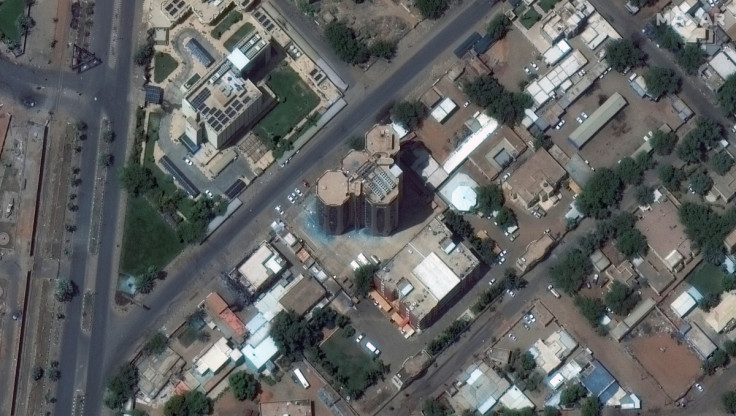'Past Catastrophic': Sudan Fighting Shutters Khartoum's Hospitals

The few hospitals still operating in Khartoum after Sudan's sudden explosion into war have bodies lying unburied, bullets crashing through windows and terrified medics staying away as artillery pounds nearby.
Doctors and hospital staff describe harrowing conditions with no water for cleaning, little electricity for life-saving equipment and food running out, forcing them to send sick patients home and turn away the injured.
Many of Sudan's best hospitals are concentrated in the central Khartoum streets where the most intense fighting between the army and paramilitary Rapid Support Forces is taking place, requiring doctors and patients to brave gunfire and bombardment.
At least 270 people have died since the violence erupted at the weekend, Sudan's health ministry estimates, while for the more than 2,600 people injured in the fighting as well as the many others already needing treatment, the rapid collapse of the healthcare system spells disaster.
"The hospitals now serving the wounded are so few, with limited number of doctors, so there's overcrowding of wounded," said Esraa Abou Shama, a doctor at Sudan's health ministry.
"Besides, not all the injured can reach hospital under the gunfire... We honestly need public and private hospitals to open up to provide medical services for all the injured and for all patients."
One 25-year-old university graduate who had been shot in the shoulder and declined to give his name for fear of reprisals said: "We found a functioning hospital but there was little service because there's no electricity."
At a care centre in Khartoum for children with cancer, treatment has been paused with the generator lying idle, staff said. The young children queued to collect trays of soup, rice and watermelon.
At al-Baraa, a Khartoum children's hospital, only one ward remained open this week with one medic to care for two newborn babies on ventilators, hospital manager Ashraf Elfaki said.
One died soon afterwards and the second was eventually evacuated. "I don't know what to do," said Elfaki.
Over four days of fighting nine hospitals in Sudan have been hit by artillery and 16 forcibly evacuated, the Sudanese Doctors' Union said, with none still providing a full service inside the capital.
"The hospitals are completely collapsed, devoid of all necessities. It's past catastrophic...," said Sudan's Red Crescent spokesperson Osama Othman.
'OUT OF SERVICE'
A Reuters journalist outside one Khartoum hospital this week saw an injured, bleeding civilian arriving in search of help but having to leave because there were no staff to treat him.
"All around us, we get gunfire and bombs," said Khalid Fedail, general manager at Fedail Hospital, a big private facility.
His hospital's water and cooking gas tanks have been hit, many staff fled, and diesel fuel for the power generator is almost exhausted, he said. Water tankers cannot reach the area.
Fedail Hospital was the last in its district to stay open, treating more than 30 people injured in the fighting, as other hospitals nearby were damaged by artillery fire, Fedail said.
But it can no longer operate and he is working to transfer patients home, with instructions on self-care, or to the few remaining medical facilities still working. "We're out of service until this all ends," Fedail said.
At al-Baraa children's hospital two nurses were injured by stray bullets while working on an upper storey, said senior manager Elfaki.
"There is huge panic among the medical staff because they are not used to these sounds, with artillery," he said.
"Across the world, hospitals have security during wartime. They can get their supplies, workers can come and go safely, but we don't have this," he said, adding that soldiers could be seen patrolling in front of the hospital on Tuesday.
World Health Organisation regional head Ahmed al-Mandhari said medics were facing real danger.
"We are extremely concerned about reports of armed attacks against health institutions, kidnapping ambulances while transporting patients with the medics inside. Health institutions are looted and occupied," he said.
INJURIES
Luay Ahmed, a volunteer at al-Duwali hospital in Khartoum's adjoining sister city of Bahri, complained of a lack of supplies including intravenous drips and life-saving medicines.
"This is the only hospital still accepting injured and we're getting more every day. Some go into surgery, others get triaged, but the capacity is very low," he said.
Staff cannot access the morgue because of the fighting, so dead bodies are stored in rooms with air conditioning turned up.
Some bodies have simply lain in the open air, according to one visitor there this week.
"We all have the same problems - electricity, water, staff. That's what's going to bring down the health system," Ahmed said.
Chronic patients, such as those in need of dialysis treatment, have few options.
At a hospital in the west of Khartoum, a 54 year-old, looking tired and too frightened to give his name, said dialysis was the last service still operating there.
"I don't know if the service will still be here in the next few days because of the war," he said.
© Copyright Thomson Reuters 2024. All rights reserved.





















